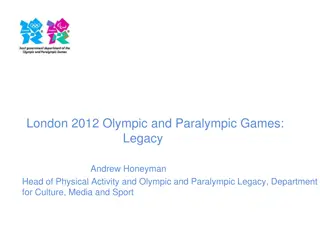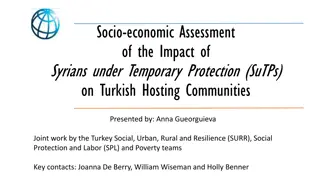Economic Impact of Hosting the Olympics: A Case Study of London 2012
London hosted the 2012 Olympics, with a significant economic impact on the country. The Games saw record-breaking coverage and participation, but also incurred substantial costs. The total expenditure exceeded the original budget, with the government and various entities contributing to funding. Despite the expenses, the final economic report indicated a lower overall cost than initially projected, benefiting from increased economic activity and investments.
Download Presentation

Please find below an Image/Link to download the presentation.
The content on the website is provided AS IS for your information and personal use only. It may not be sold, licensed, or shared on other websites without obtaining consent from the author. Download presentation by click this link. If you encounter any issues during the download, it is possible that the publisher has removed the file from their server.
E N D
Presentation Transcript
How Hosting the How Hosting the Olympics Effects A Olympics Effects A Country s Economy? Country s Economy?
London Olympics 2012 London Olympics 2012 The games began on the 25th of July and ended on the 12th August 2012. London was selected as the host city on 6 July 2005, defeating bids from Moscow, New York City, Madrid and Paris. London was the first city to host the modern Olympic Games three times, having previously done so in 1908 and 1948.
10,568 athletes from 204 National Olympic Committees participated (5,892 male and 4,676 female). Record breaking coverage. 90% of the UK population watched BBC coverage of the Olympic Games. London 2012 was the most watched televised event in American history, with more than 219 million views.
Cost of The Olympics The original budget for the Games was 2.4 billion, but this was increased almost fourfold to about 9.3 billion in 2007. The breakdown was: Building the venues and infrastructure 5.3 billion. Elite sport and Paralympic funding 400 million. Security and policing 600 million. Regeneration of the Lower Lea Valley 1.7 billion. Contingency fund 2.7 billion.
Who is paying for the Olympics? 5.975 billion Central Government 2.175 billion National Lottery 925 million Greater London Authority 250 million London Development Agency
The final quarterly economic report published by the UK government's Department for Culture Media and Sport said the overall cost of delivering the Games was 8.92 billion, lower than the 9.3bn set aside. That works out at 142 per head for every man, woman and child in the United Kingdom.
-The single biggest item of spending is preparing the Olympic park: at 1.822bn, it includes the local infrastructure, roads, cleaning up the site and power lines. - That's followed by the venues, which cost 1.106bn, and the most was the Olympic stadium at 428m. -The cheapest venue was the basketball arena at only 4m. -Security was budgeted at 533m - another 475m budgeted to cover army, security services and police.
Provides Jobs -In total, more than 46,000 people worked on the Olympic Park and Olympic Village 10 per cent of whom were previously unemployed while, at the peak of the Games, around 39 per cent of people directly employed by LOCOG(London Organising Committee of the Olympic and Paralympic Games) were unemployed prior to their involvement in the Games, with schemes put in place to improve the professional skills of the unemployed and their employment prospects after the Games. -The Games also had a positive impact on unemployment levels, with independent experts reporting that Games preparations were a major factor behind a 1.2 per cent reduction in London's unemployment rate in early 2012. -Estimates now suggest that the 2012 Games are expected to create 17,900 additional jobs per year between 2012 and 2015, with 70,000 workless Londoners already helped into Games-related employment, creating a labour market legacy. Workers who found construction jobs as a result of London 2012 are estimated to earn, on average, GBP 40,000 each.
Tourism -As a result of the Games, the UK is expected to welcome 4 million additional visitors by 2015. -International visitors are expected to spend GBP 2.7 billion in the three-year period following the Games, resulting in a GBP 1.4 billion increase in economic output, on average, each year. -The Orbit, the UK s tallest sculpture, is expected to become one of London s top tourist attractions, generating up to GBP 10 million a year. -The large number of tourists who flocked to London for the 2012 Olympic Games also helped lift the British economy, with figures released by the Office of National Statistics showing that the 590,000 people who visited the city for the Games, or attended a ticketed event, spent an average of GBP 1,290 during their visit, compared with GBP 650 by other visitors.
Public Health -GBP 30 million will be invested in a National Sports and Exercise Medicine Centre of Excellence to promote sport and physical activity within healthcare. -Sportswear company Adidas invested GBP 1 million in five giant multi-sport outdoor venues called adiZones to encourage Londoners to participate in sport. -The Olympic and Paralympic Games inspired over 2,000 community projects designed to educate young people in the UK about sport, health & fitness, art and Olympic values.
Environmental Legacy -The London Games set new standards for sustainable construction and development practices by integrating sustainability goals into all aspects of Games preparations. -To reduce the environmental impact of the massive construction project, workers dredged the River Lea to create a canal network that was used to transport construction materials to the site. -More than 98 per cent of the demolition waste from decrepit buildings that were torn down was recycled. -300,000 plants were planted in the Olympic Park s wetlands area. Over 1,000 new trees were planted in East London. -The UK government will invest GBP 300 million to transform the Olympic site into the Queen Elizabeth Olympic Park , which will include housing, new schools, health centres, business space and sports venues.
The London Olympic Athletes' Village is the largest sustainable homes project in the UK. The 292m project will remove temporary venues, to create a new London community. This will create 2,818 new homes, including 1,379 affordable homes and houses, for sale and rent. The wider community is planned with wide vistas filled with gardens, parks and communal areas, within which are to be housed a school, a health clinic and shops.
-The Stadium at Queen Elizabeth Olympic Park, commonly known as the Olympic Stadium, is a stadium located in London, England. -It hosted the track and field events, along with its opening and closing ceremonies. -The stadium is currently under renovation, having been closed since 2013 for transformation works. Once re-opened in 2016, it will have a standard capacity of 54,000 and will be the long-term home of West Ham United Football Club and British Athletics which cost 12 billion to redevelop.
Transport -Transport for London invested GBP 6.5 billion in transport infrastructure in preparation for the 2012 Games. -Ten railway lines and 30 new bridges will continue to connect London communities after the Games. -At least 60 Games-related projects promoted greener travel, including a GBP 10 million investment to upgrade pedestrian and cycling routes across London. -A fleet of 200 electric vehicles transported Olympians, supported by 120 charging stations that created the UK s largest network of recharging points. The charging stations will support emission-free travel long after the Games.
Civic Pride -According to a poll by Freeview for the British Pride Index, three-quarters of UK residents felt proud to be British at the end of the Games. Many speculated that the UK s success at the Olympics. -Research shows that 74 per cent of UK adults agree that the Paralympic Games has shown the world how to treat people with disabilities with respect and equality. This is an improvement on the 52 per cent expectation set in June 2010. -Building Olympic park has helped to regenerate the East end of London, which has increased the pride of the city.
Economic Growth -By 2020 the economic impact is estimated to be 28 billion to 41 billion in Gross Value Added (GVA) and 618,000 to 893,000 years of employment. -So far 9.9 billion in international trade and inward investment has been won because of the Games and Games-time promotional activity with more being announced. - 120 million of contracts already won by UK companies from the Brazil 2014 World Cup and Rio 2016 Olympic and Paralympic Games. -More than 60 contracts won by UK companies for the Sochi 2014 Winter Olympics and Russia 2018 World Cup. -1% increase in international visitor numbers to the UK and 4% increase in visitor spend in 2013, tourist spend is expected to exceed 19 billion for the first time.
The UK economy emerged from recession in the three months from July to September, helped by the Olympic Games. -The economy grew by 1.0%, according to official gross domestic product figures (GDP),which measure the value of everything produced in the country. -The data also exceeded expectations from economists, who had predicted an increase of 0.6% in the quarter.
-During July and August, visitors spent about GBP 760 million in the UK, averaging GBP 1,290 per person almost double the normal amount. Expenditure from overseas visitors in August, including Games ticket sales, totalled GBP 4.5 billion. -Factoring in pre-Games construction and other early Games-related economic activity, an Oxford Economics study commissioned by the Lloyds banking group estimates that the Games will generate GBP 16.5 billion for the British economy from 2005 to 2017.
Business Opportunities -About 98 per cent of the GBP 7 billion worth of contracts went to UK-based companies, two-thirds of which were small or medium-sized businesses. -At the close of London 2012, GBP 14 billion in new business deals had been announced, further strengthening the UK s international business legacy. -The success of 2012 has created opportunities for UK companies to help deliver the Rio 2016 and Sochi 2014 Olympic Games, as well as the Qatar 2022 World Cup.
Trade and Investment The UK economy has seen a 9.9bn boost in trade and investment from hosting the 2012 London Olympic and Paralympic Games, research suggests. The report, for the UK Trade and Investment department (UKTI), said the Olympics resulted in: - 2.5bn "additional inward investment", 58% of which was outside London. - 5.9bn additional sales following Olympic-related promotions by the Foreign Office and UKTI. - 1.5bn high value overseas contracts - such as helping to design venues in other host- nations.
Trade: -Neal s Yard Remedies, a leading UK organic health and beauty care provider who manufactures in Dorset, has announced a 10 year franchise agreement with Starluxe to open 20 stores in Korea to bring in 10 million over the next 5 years. -Rochdale-based Precision Technologies Group has secured 3.85 million in export orders to one of China s leading specialists in ice systems and industrial cooling technologies and Taiwan s premier air and refrigeration compressor specialists. -Skin care company Bulldog, has predicted 10 million of export sales and up to 20 new jobs after a number of business wins, predominantly in Sweden.
Inward Investment: -US advertising company Intent Media is investing 5 million to open an office in London creating 50 new jobs over the next 2 years. -Leading Japanese ICT company KDDI is investing a further 135 million into Telehouse s data centre campus at London Docklands. -Samsung has announced it will create 358 customer support jobs in Leeds at a new customer call centre based in Claypit Lane.
Prime Minister David Cameron said: "This 9.9 billion boost to the UK economy is a reminder to the world that, if you want the best, if you want professionalism, if you want jobs done on time and on budget then you should think British. Business Secretary Vince Cable said: "There is no doubt that the London 2012 Games proved a success story for British business. This has created a multi-billion pound business springboard to take British expertise to the world, and UKTI (UK Trade and Investment) is working hard to make the most of this significant opportunity. "UKTI has embraced the challenge of delivering 11 billion of economic benefit from the Olympics. Reaching 9.9bn in the space of one year is an amazing achievement.
The London 2012 Games have definitively served as a catalyst for development and improvements, both tangible and intangible, which would otherwise have taken decades to achieve.























